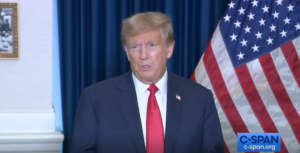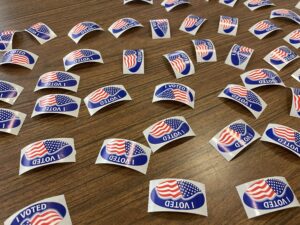By Ryan Nadeau / Capital News Service
Two community leaders are campaigning for the open House District 65 seat, containing Fredericksburg city and parts of Stafford and Spotsylvania counties, which was left vacant after extensive redistricting.
Democratic candidate Joshua Cole is a local pastor and president of the Stafford County NAACP. Cole grew up in Stafford and previously served in the House of Delegates from 2020-22, when parts of District 65 were then District 28.
Cole lost his next election bid to Del. Tara Durant, R-Stafford, by less than a thousand votes. He believes he is most qualified to serve this district due to his previous legislative work.
“Let’s see what we can do, and keep fighting for – as I say all the time, ‘Lottie, Dottie and everybody,’” Cole said.
Republican candidate Lee Peters III is a captain with the Stafford County Sheriff’s Office, which he joined in 2004. The Midwest-born former Marine moved to the area after the birth of his daughter.
During a September debate at the University of Mary Washington, Peters said he has put decades of work into bettering the district.
“I want to make sure that we have true investments in our community to make the Fredericksburg region a powerful place to live and work,” Peters said at the debate.
Peters was “handpicked and bought” by the Republican Party, Cole said. Peters agreed he was handpicked, but found the idea of being bought “insulting.”
Capital News Service made multiple attempts by phone and email to interview Peters. His campaign manager said Peters would “not be partaking in that.” The campaign also would not submit a written statement, though CNS asked multiple times.
Cole was a top fundraiser between July 1 and Aug. 31, according to the Virginia Public Access Project. He generated $588,131 in campaign support. Peters raised $352,244 in that same period.
Cole’s top donor in the recent filing period was the Clean Virginia Fund, at $150,000. Peters’ campaign is funded by multiple Republican leadership organizations.
HD 65 at a glance
Voters in this newly-drawn, competitive district do not clearly favor either party. Voters have steered more Democratic in recent Congressional elections, but state elections have been more narrow.
The two most recent gubernatorial races were won by roughly 51% of the vote. The past two presidential elections don’t have a decisive party lean: 2020 is hard to accurately calculate given the way early votes were assigned and 2016 was decided on a .2% margin.

A victory in this district depends entirely on turnout, according to Stephen Farnsworth, UMW Center for Leadership and Media Studies director, who moderated the debate.
“These hot button issues are not so much about persuading independents, but much more about convincing people who would support them … to actually do so,” Farnsworth said.
Abortion and the “parents’ rights movement” are wise topics to invest in, since Cole and Peters are on level ground in many other focus areas, Farnsworth said.
Constituents and debate panelists asked questions about the district’s affordable housing needs, crime, transportation funding, teacher shortage and an abortion ban.
Both candidates agree solutions are needed to improve home ownership and tackle the district’s median housing costs and rent, which are above the Virginia average. Additionally, the poverty rate in Fredericksburg is nearly four points over state average.
They also support sending more funding to schools and increasing teacher wages, which are lower in the district than the state average of about $60,000.
Abortion
A recent UMW survey found 57% of Virginians believe abortion should be legal in all or most cases, while 35% believe it should be illegal in all or most cases.
Cole has campaigned extensively to keep Virginia’s current abortion law. He wants to codify Roe v. Wade on a state level, and said the majority of constituents agree regardless of party.
Older constituents have a unique perspective on what a ban could mean, Cole said.
“I don’t remember the ‘50s and the ‘60s, before Roe v. Wade, but they do,” he said. “And they remember the alleyways. And they don’t want Virginia to go back to that.”
Peters’ website does not list his stance on abortion, and he had not gone on the record about it prior to the debate.
“It’s a very personal issue,” he said at the debate. “An issue that should never come out of a room with a doctor, a mom and a dad.”
A 15-week term limit is the “best compromise,” Peters said at the debate.
Law and order
Peters hopes his law enforcement experience will appeal to voters, and promises to make sure local agencies have the needed personnel, training and tools to fight crime. Peters draws on his experience in criticism of his opponent, who he says does not support officers.
Officers have a harder time doing their jobs because of changes made to Virginia law while Cole was in office, Peters said at the debate.
Cole supported a bill that regulated officer traffic stops in a variety of ways. He also supported a bill that would end qualified immunity, though that bill failed in the Democratic-led Senate.
Cole said he has never supported efforts to “defund the police,” as Peters’ political ads challenge. His budget amendment granted more funding to regional police academies. He also shared his support of budget amendments that increased officer pay.
Ending qualified immunity is not about endangering officers, it’s about job accountability, Cole said. The bills were put together with police input, he said, and some provisions made officers feel more safe rather than less.
“We hear it all the time – the police officers say: ‘There’s no one who hates a bad cop more than a good cop doing their job,” Cole said.
Transportation
The average commute for Stafford and Spotsylvania residents is nearly 40 minutes – just about 10 minutes higher than state average, according to the most recent U.S. Census data.
The area has freight and commuter bottlenecks and is considered a hotspot for traffic jams.
Both candidates want to improve the region’s transportation infrastructure and agree the district should have its own regional transportation authority.
“We have to have a voice in how that money is spent,” Peters said.
Cole patroned a bill in 2021 to create a planning committee for such an authority, but the bill failed.
Our stories may be republished online or in print under Creative Commons license CC BY-NC-ND 4.0. We ask that you edit only for style or to shorten, provide proper attribution and link to our website. AP and Getty images may not be republished. Please see our republishing guidelines for use of any other photos and graphics.





